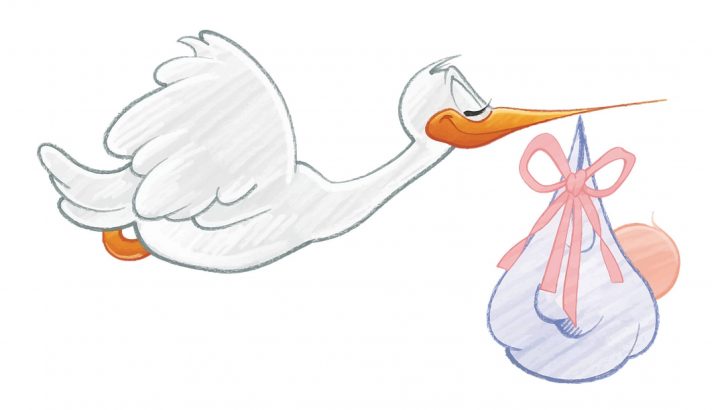Irish people must start having children in their 20s, writes David Quinn
Almost half of women aged 18 to 24 would consider freezing their eggs according to a new survey from the Royal College of Obstetricians and Gynaecologists in the UK. They would do so in order to ‘preserve their fertility’ in the hope of starting a family one day.
This finding dovetails nicely with the theme of a programme RTÉ aired last week called Fertility Shock, which looked at Ireland’s below-replacement level birth rates.
The Irish birth rate is around 1.8 children per woman, well below the 2.1 needed to keep our population stable without immigration. This means the population is set to age rapidly even with high levels of immigration.
At present, there are about 600,000 people in Ireland aged 65 and over. This is projected by the CSO to rise to around 1.6 million by the middle part of the century, which is only 30 years away.
The percentage of over 65s compared with those aged 15-64 is expected to increase from 20% to today, to about 40% by 2050. This is completely unsustainable. It means too few people of working age will be supporting too many dependents, and unlike in the past, the dependents will mostly be retirees, not children. A country like that has no future.
And Ireland isn’t even close to the worst example in Europe. In fact, as low as it is, we have one of Europe’s highest birth rates. Countries like Italy, Greece, Spain and Germany are ageing far more quickly than we are.
Decline
The finding that so many young women in Britain would consider freezing their eggs is a good indicator of why we are where we are. Most people are now waiting until they are well into their 30s before they have their first child. By then, a woman’s fertility is declining rapidly and she has only a few more years left in which she can have children.
The presenter of Fertility Shock, journalist Dearbhail McDonald, spoke to some young people at music event Electric Picnic about when they wanted to have children. They all wanted to wait until they are a lot older, in their 30s, because they “want to live life first”.
Well, that’s all very well, but you can’t ultimately buck nature. In your own mind you think you can delay having children until you are well into your 30s, but your body isn’t listening. It is aging pretty much the same as everyone else’s bodies have been aging since the dawn of time. Your body and your fertility won’t be frozen at age 20 just because it suits you.
This is where egg freezing comes in. It allows the illusion that you can, sort of, freeze time. It allows a woman to think that if she extracts some eggs from her body now, she can have a child later, even if she never met someone she wants to settle down with. Meanwhile she can concentrate on her career.
But of course, life usually doesn’t work that way. To begin with, having a baby this way has only a small chance of working, especially if you wait until you are in your 30s, never mind your 40s. Secondly, it is very expensive.
In addition, there are multiple ethical problems with it. For example, once the eggs are fertilised, the resultant embryos might never be implanted, and many will be permanently frozen or destroyed. The latter is tantamount to abortion.
Another problem is that the sperm used will most likely be from a man that the child will never get to know. Is that fair?
In some cases, women will resort to using surrogate mothers rather than their own wombs, because of their age, or because they simply don’t want to become pregnant with their own child for whatever reason.
Those surrogates will almost certainly be lower income women, often from developing countries. They will, in effect, be the ‘handmaids’ of better-off Western women. (The Handmaid’s Tale is a drama about women who are forced to have children for other people. Surrogacy might not be directly coercive, but it involves a great amount of economic exploitation.)
But even if egg freezing, sperm and egg donation, and surrogacy involved no ethical dilemmas, for the most part, women would still be waiting until they are well into their 30s before having children, and that is still going to mean a low birth rate.
The fact is, we are getting things the wrong way around. Both the market economy and feminism want as many women in the workplace as possible. Family and home and children are forced into second place.
But we can’t expect to do this and to have a healthy birth rate. So, what’s the answer? Should we copy the Scandinavian countries with their strongly feminist policies and affordable childcare, which is what Fertility Shock suggested?
The Scandinavian countries appear on the surface to give women a chance to reconcile work and family life, but when we look closer, their policies haven’t made much difference to their birth rates. Sweden has a birth rate more or less identical to ours, while those of Denmark, Norway and Finland are all lower.
Hungary is now attempting something quite radical. It has announced extremely strong financial inducements to any couples having more than two children, and a woman who has four, will never pay any income tax again. We await the effect of this on the birth rate.
But the bottom line is that we cannot hope to bring our birth rates in line with what we need to keep the number of older and younger people in the right balance unless we start having children again when we are in our 20s.
That is not going to happen so long as we think our 20s isn’t the time to have children, but to “live it up”.


 David Quinn
David Quinn
